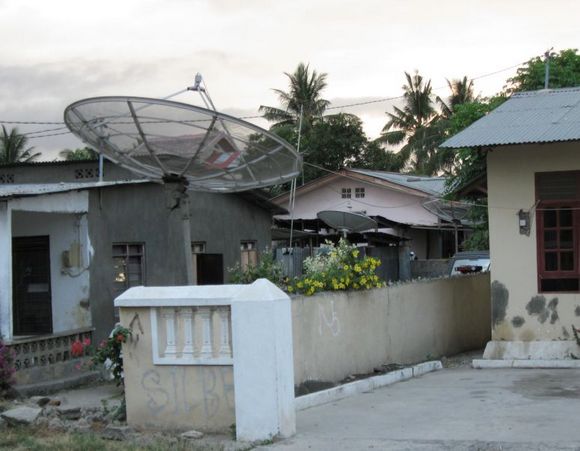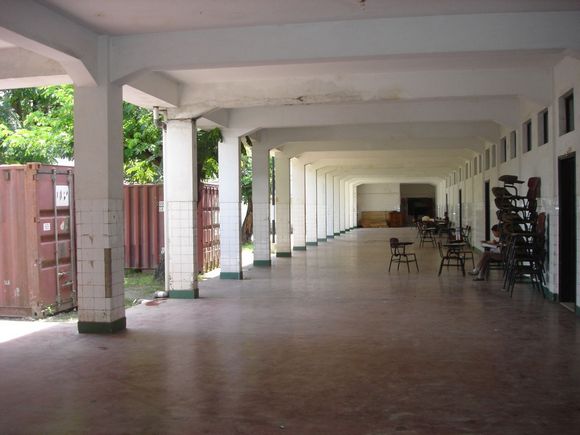Angie Bexley
The under resourced National University in East TimorHedda Haugen-Askland |
Maun Mario’s house in Bemori in Dili is bustling with party preparations. In fact things are bordering on the chaotic. Aunties have arrived from Los Palos and since this morning they have been in the kitchen busily preparing special meat dishes and desserts. Hungry dogs gather at the kitchen door for off-cuts and sporadically burst into fighting. Older cousins are squawking at younger cousins to quit popping balloons and hang them up around the lounge room. The tuak palm wine has begun to mysteriously disappear.
The cause for celebration is the return of Maun Mario’s third daughter, Juanita, from Indonesia. In 2004, Juanita left for Indonesia to study forestry, joining the 3500 other Timorese students there. It is a double celebration because Maun Mario’s fourth child, Philipe, will leave next month to join the increasing number of Timorese students beginning their final years at an Indonesian senior high school.
Practical choices
Maun Mario’s decision to educate his children in Indonesia rather than in East Timor is based on practicalities. ‘It’s like this,’ Mario explains in his usual forthright manner, ‘we are a new country, and our quality of education is not like that of Indonesia. It is difficult for them to learn in Portuguese here. It is better they go and learn their subjects rather than worrying about first learning a foreign language and then learning their subjects.’ Mario is referring to the inhibiting challenges of learning Portuguese, the sole language of higher education in East Timor. Although Indonesian educated Timorese continue to face challenges in finding work when they return to East Timor, it is important for Mario that his children get a solid education, rather than acquire an additional language and limited literacy.
Juanita agrees with her father. ‘It was easier for me there,’ she explains. ‘We don’t have the facilities yet here in Timor. Also, I grew up with Indonesian being taught in school, so it was familiar.’ Even so, writing essays in Indonesian was still a challenge for her, and she had to repeat her first year. This is why the family has decided to send her younger brother earlier, so he is better prepared for his tertiary studies. The logic is that by the time Philipe begins his degree, he will be fluent in writing Indonesian and not be faced with the same challenges as Juanita. This means he will finish his degree sooner.
Maun Mario’s relatively privileged financial standing makes these sorts of decisions possible. After independence in 1999, he opened a small business in Dili dealing in building supplies, and with the profits from this business, he can now afford to educate his children to tertiary level. This involves considerable expense, because although primary and secondary school fees were abolished under the first post-independence government, (private) university fees range from $150-$500 per semester. Faced with these considerations, Maun Mario calculated that sending his children to be educated in Indonesia was more economical than educating them in Timor despite the fact that international fees in Indonesia can also be quite high. After the initial outlay of fees and relocation costs, lower living costs in Java make the total package cheaper than it would be in Timor. While going to Indonesia for schooling is a relative privilege for those who can afford it, the less wealthy also see it as a wise choice. Many families with whom I spoke in the district of Lautem, for example, told me they would send their children to Indonesia for schooling without a second thought, if they could afford it, because Indonesia still remains a relevant source of cultural influence.
Familiarity with and enjoyment of Indonesian popular culture and language makes the Indonesian option still attractive to many young Timorese
Maun Mario, Juanita and Philipe see no hint of irony in the choice of the former coloniser as a place for study. Apart from the financial considerations, and even though the children’s fluency in Portuguese is improving, Indonesia remains the better option. With a next door neighbour as big as Indonesia, and with their existing fluency in the Indonesian language, the decision to opt for tertiary education in Indonesia seems a pragmatic choice. ‘It is important to understand one’s neighbour,’ they explain.
Cultural blending
There are other reasons that encourage the choice of schooling in Indonesia, beyond the financial and linguistic. Indonesian pop culture remains a visible and audible part of Timorese social life. The Indonesian pop band Jamrud has played in Dili on a number of occasions, and the dangdut band Trio Macan performed there in October 2008. With the local pop music scene still in its infancy (see Sloman, this edition) and Indonesian still being used by many urban and rural Timorese youth, places like Timor are a logical extension of Indonesian pop culture’s reach.
 |
Satellite dishes beaming in Indonesian television – a common site in Dili, East TimorThushara Dibley |
In the private space of the family home the situation is the same. The newly installed satellite dish in the front yard of Maun Mario’s house beams Indonesian soap operas (sinetron) and the latest Indonesian MTV music shows into the family’s lounge room. In this house, these are the most watched shows, alongside the news broadcasts in Tetum. The family finds the local broadcasts of Portuguese telenova unfamiliar and difficult to follow, and they do not relate easily to their Western characters, rhythms and themes. The sense of modernity expressed in sinetrons, with their ostentatious villas and glamorous lifestyles may be out of reach for these Timorese, as it is for most Indonesians, but these shows touch on what is culturally familiar, exposing the complex position Indonesia occupies in Timorese social life.
Student lineages
There are also historical reasons why Timorese students continue to choose Indonesia for their education. Timorese tertiary students were first sent to Indonesia in the early 1980s under the New Order regime’s policy of assimilation. Many more students were sent during the period from 1980s onwards, when Mario Carrascalão served as the first Timorese governor of the then Indonesian province of Timor Timur. The students received local government scholarships in return for an oath of allegiance to the Indonesian state ideology, Pancasila. But the New Order’s attempts to turn these students into loyal Indonesian citizens failed. Many of the Timorese students in Indonesia were instead secretly recruited into the anti-New Order student movement, and played a significant role in both the downfall of Suharto in 1998 and the decision to hold a referendum in East Timor in 1999.
Studying in Indonesia during the resistance provided young Timorese with a very different set of experiences from those of their parents. The separation from their parents and daily village life meant they had to form their own support networks and new ways of life. They developed their own youth culture based on a complex blend of Timorese traditions (including the church), Indonesian resistance culture and Indonesian pop culture.
Young Timorese were drawn into, and helped create, a culture of secrecy and subterfuge. During the struggle, it was common for Timorese students not to finish their degrees. A common saying among the students of the time was ‘better we forfeit our degrees than lose our homeland’. Many were busy organising risky demonstrations or discussions, and acting as conduits for communication between resistance leaders in Indonesia and Timor. They were in awe of their militant leaders, most notably the Falintil Commander in Chief and leader of the clandestine struggle, Xanana Gusmão, who spent seven years in Cipinang prison in Jakarta.
These close-knit networks of students served as family-like structures in the long years that many young students were separated from their families in Timor. The experiences of older family members in Indonesia provide a solid connection in which young Timorese can imagine Indonesia as a practical choice for education.
Contemporary challenges
Today in Indonesia, Timorese students are not burdened by the underground and dangerous work of the resistance. They are, however, driven by familiar motives: how to use their experiences and knowledge to assist with the ongoing recovery of East Timor after they return home. It is very rare for students not to return to Timor after their studies are complete. Many hope to return to their hometowns or work in Dili on development issues.
Although they are more likely to be struggling to finish their theses than engaging in covert independence activism, the young Timorese students in Indonesia today face many challenges. Most significantly, they do not have the strong network the students who went before them could rely on. They must find their own way. As a result, students in a number of cities, including Yogyakarta and Jakarta, have formed student groups to assist them with matters of complex bureaucracy such as visa requirements. Some students still report occasional threats of violence and discrimination, particularly in dealing with the bureaucracy on and off campus.
Maun Mario calculated that sending his children to be educated in Indonesia was more economical than educating them in Timor
Some students face particular problems and not all students are lucky enough to have families in as strong an economic position as Maun Mario. The Timorese embassy in Jakarta estimates that of the 3500 Timorese students in Indonesia, there are approximately 500 who have unofficial status. This means they have enrolled at university as local students by making fake KTP-identity cards. In effect, many students take on a second (Indonesian) identity so as to avoid the Indonesian international university fees. One such ‘KTP student’ was involved in a car accident and the embassy was unable to assist, due to his unclear citizenship status. Others are attempting to become Indonesian citizens. One student’s case was publicised on the East Timor mailing list, ETAN (30/06/08) when he had lost a significant sum of money trying to extend his visa to no avail. With no help from the embassy, he decided to take out Indonesian citizenship and to forego his Timorese passport so he could continue his education.
Looking to the future
Even if a student is able to overcome all the challenges and successfully complete a university degree in Indonesia, this is still no guarantee of securing work back in East Timor. The language policy that has installed Portuguese as an official language in East Timor privileges the Portuguese-speaking elite and continues to discriminate against the sarjana supermi, or ‘instant noodle’ graduates, a term used by the elite to deride the Indonesian-educated graduates. The decision to adopt Portuguese was intended to do away with the trauma associated with the Indonesian language and Indonesian culture in the minds of many Timorese. However, people’s familiarity with and enjoyment of Indonesian popular culture and language makes the Indonesian option still attractive to many young Timorese, especially for those who can afford it. It seems that while the Timorese government may be taking its time to reconsider the direction of its cultural policies away from Portugal, its citizens see no reason to re-orient their everyday lives away from Indonesia. ii
Angie Bexley (Angie.Bexley@anu.edu.au) is a PhD candidate at the ANU. She is researching histories of young East Timorese during the resistance and throughout the early years of East Timor’s independence.
